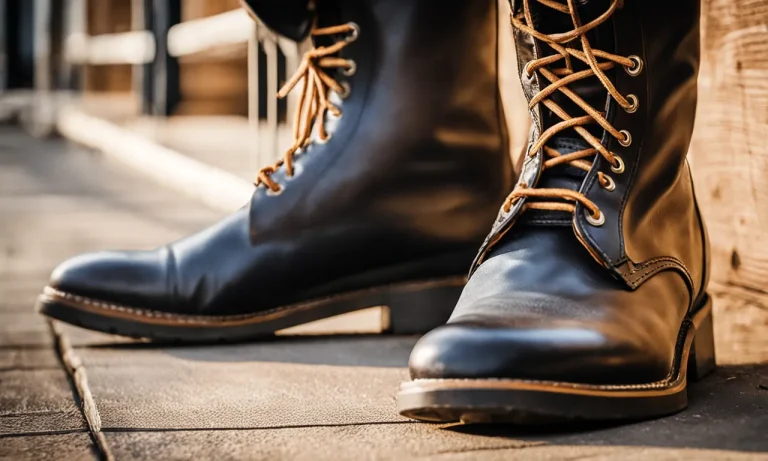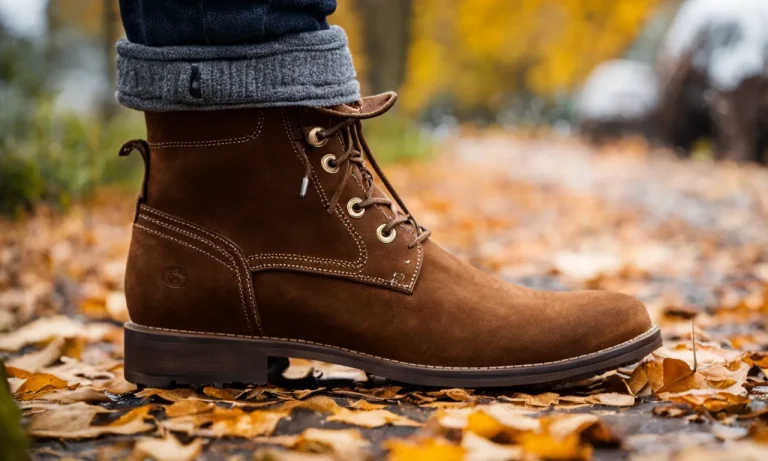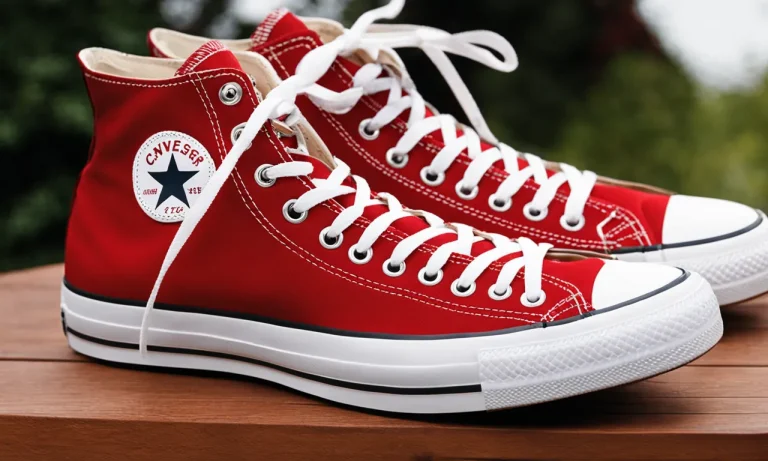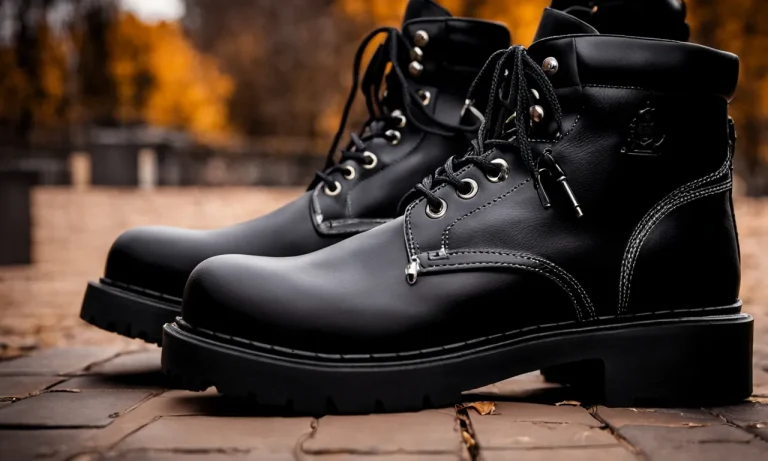For many people, a good pair of hiking boots seems like it could make the perfect work boot. Rugged, supportive, and comfortable, hiking boots check a lot of boxes when it comes to occupational footwear needs. But are hiking boots really suitable for wearing to work?
Let’s take a detailed look at the pros and cons to find out.
If you’re short on time, here’s the quick answer: Hiking boots can be great work boots for jobs that involve being on your feet all day, especially if the work is outdoors on rough terrain. However, for jobs that require polishable leather shoes or a safety toe, hiking boots may not meet dress code or safety requirements.
Advantages of Hiking Boots as Work Boots
All-Day Comfort and Support
Hiking boots are designed to provide excellent comfort and support, making them a great option for work boots. The cushioning and padding in hiking boots help to reduce fatigue and strain on the feet, even when standing or walking for long periods.
The sturdy construction and ankle support of hiking boots also provide stability and prevent injuries. So, whether you’re working on a construction site or spending hours on your feet in a warehouse, hiking boots can keep you comfortable and protected throughout the day.
Traction and Stability
One of the key advantages of hiking boots as work boots is their superior traction. Hiking boots are designed with rugged outsoles that provide excellent grip on various surfaces, including slippery or uneven terrain.
This makes them perfect for jobs that require you to work outdoors or in challenging environments. Whether you’re navigating through muddy construction sites or walking on icy paths, hiking boots can provide the traction and stability you need to stay safe and perform your job effectively.
Waterproof Options Available
Hiking boots often come with waterproof features, such as Gore-Tex membranes or treated leather uppers. This means they can keep your feet dry and comfortable even in wet or rainy conditions. For those who work in outdoor settings where exposure to water or moisture is common, such as landscaping or farming, having waterproof hiking boots can be a game-changer.
You don’t have to worry about soggy or uncomfortable feet throughout the workday.
Durability and Long Lifespan
Hiking boots are built to withstand rugged terrains and harsh weather conditions, which makes them incredibly durable. The materials used in hiking boots, such as high-quality leather or synthetic fabrics, are designed to resist abrasion and provide long-lasting performance.
When compared to traditional work boots, hiking boots often have a longer lifespan, which means you won’t have to replace them as frequently. Investing in a good pair of hiking boots can save you money in the long run.
Potential Drawbacks of Hiking Boots for Work
May Not Meet Dress Code Requirements
Hiking boots are designed to be durable and comfortable for outdoor activities, but they may not meet the dress code requirements of certain workplaces. Many companies have specific guidelines on the type of footwear that employees are allowed to wear, and hiking boots may not be considered appropriate in these settings.
It’s important to check with your employer or HR department to ensure that wearing hiking boots to work is permitted.
Lack Safety Toes
One of the potential drawbacks of using hiking boots for work is that they often lack safety toes. Safety toes, such as steel or composite toe caps, are designed to protect the feet from impact and compression hazards in the workplace.
In jobs where there is a risk of heavy objects falling or rolling onto the feet, safety toes are a crucial safety feature. Hiking boots, on the other hand, are typically not equipped with this type of protection.
Not Slip-Resistant Enough for Some Jobs
While hiking boots are generally designed to provide good traction on various terrains, they may not be slip-resistant enough for certain work environments. Some jobs, such as those in the food service industry or construction sites, require footwear with high slip-resistance to prevent accidents and injuries.
If your job requires you to work in slippery conditions, it may be necessary to invest in work boots that are specifically designed for this purpose.
Lack Ankle Support Needed for Some Jobs
Another potential drawback of using hiking boots for work is that they may lack the ankle support needed for certain jobs. Jobs that involve a lot of heavy lifting or working on uneven surfaces can put a strain on the ankles.
Work boots with proper ankle support can help reduce the risk of ankle injuries. While hiking boots do provide some level of ankle support, they may not be as supportive as work boots that are specifically designed for the demands of the job.
Jobs Where Hiking Boots Can Work Well
Park Ranger
Being a park ranger requires spending long hours outdoors, often in rugged terrain. Hiking boots are an excellent choice for park rangers as they provide the necessary support, traction, and protection.
Whether they are patrolling the park, conducting wildlife surveys, or maintaining trails, park rangers can rely on their hiking boots to keep their feet comfortable and secure.
Landscaper
Landscapers work in various outdoor environments, dealing with different types of terrain and weather conditions. Hiking boots can be a great option for landscapers as they offer durability and stability.
With features like reinforced toe caps and slip-resistant soles, hiking boots provide protection against sharp objects and ensure a firm grip on uneven surfaces. This can help landscapers work efficiently and safely.
Construction Worker
Construction sites are known for their demanding conditions, including heavy machinery, debris, and uneven terrain. Hiking boots are well-suited for construction workers, providing the necessary ankle support and protection from potential hazards.
Additionally, the sturdy construction and durable materials of hiking boots make them capable of withstanding the rigors of the construction industry.
Farm Hand
Farm hands often work in muddy fields, barns, and other challenging environments. Hiking boots can be a reliable choice for farm hands as they offer waterproofing and traction. These boots can keep feet dry and comfortable while providing the necessary stability for working on slippery surfaces.
The ankle support provided by hiking boots can also help prevent injuries when moving around livestock or heavy equipment.
Warehouse Worker
Warehouse workers spend long hours on their feet, often moving heavy boxes and operating machinery. Hiking boots can be a suitable option for warehouse workers due to their comfort and durability. The cushioning and arch support in hiking boots can help alleviate foot fatigue, while the reinforced construction can protect against potential hazards in the warehouse environment.
Tips for Choosing the Best Hiking Boots for Work
Prioritize Comfort and Support
When choosing hiking boots for work, it is crucial to prioritize comfort and support. After all, you’ll be spending long hours on your feet, and the last thing you want is uncomfortable footwear causing pain or fatigue.
Look for boots with cushioned insoles and adequate arch support to ensure maximum comfort throughout the day. Additionally, consider boots with a padded collar and tongue for extra cushioning and ankle support.
Consider Waterproofing
Depending on your work environment, waterproof hiking boots may be essential. If you work outdoors or in a setting where you may encounter wet conditions, investing in waterproof boots is a wise decision. They will keep your feet dry and protected, preventing discomfort and potential health issues.
Waterproof boots are typically made from materials such as Gore-Tex or other waterproof membranes, providing excellent protection against moisture.
Look for Slip-Resistant Soles
When it comes to work boots, slip resistance is crucial for safety. Look for boots with slip-resistant soles that provide excellent traction on various surfaces. This is especially important if you work in industries such as construction, manufacturing, or any other field where slippery surfaces are common.
Slip-resistant soles can significantly reduce the risk of accidents and injuries, making them an essential feature to consider.
Get Boots with Ankle Support If Needed
If your work involves activities that put stress on your ankles, such as climbing ladders or walking on uneven terrain, it’s important to choose hiking boots with adequate ankle support. High-top boots with good ankle support can help prevent twists and sprains, providing stability and reducing the risk of injury.
Ensure that the boots you choose have a firm and supportive structure around the ankle area to offer the necessary protection.
Conclusion
When chosen carefully based on your job requirements, hiking boots can make excellent work boots thanks to their comfort, durability, and traction. Just be sure to check if they meet any safety or dress code regulations for your workplace.
With the right pair, your trusty hiking boots may just become your go-to work shoes as well.






